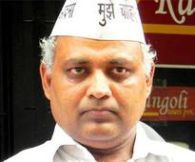A Supreme Court advocate and an Indian Institute of Technology Delhi alumnus, Somnath Bharti is convinced that he is today in a position to transform the judicial system of the country. Somesh Jha reports
 Delhi's Law Minister Somnath Bharti claims to be a man on a mission. His professed aim is to transform the judicial system of the country. A Supreme Court advocate and an Indian Institute of Technology Delhi alumnus, he is convinced that he is today in a position to achieve a part of this goal.
Delhi's Law Minister Somnath Bharti claims to be a man on a mission. His professed aim is to transform the judicial system of the country. A Supreme Court advocate and an Indian Institute of Technology Delhi alumnus, he is convinced that he is today in a position to achieve a part of this goal.
A chance meeting with social activist and now the Chief Minister of Delhi Arvind Kejriwal at a function at IIT-Delhi opened the doors to new opportunities for him. At the event, a poetic Kejriwal won over Bharti who was looking for someone who could provide "genuine" leadership to bring legal reforms in the country.
Soon, Bharti found himself representing Kejriwal and others in the Commonwealth Games scam case against the Delhi government.
The 39-year-old lawyer might have never imagined that he would one day become part of the government -- a minister holding the four crucial portfolios of law, administrative reforms, tourism and art and culture. But having embraced public life, he is now facing the scrutiny of political rivals and the media alike.
Hardly a month since being sworn in as a cabinet minister, Bharti finds himself confronted by the accusation of a Central Bureau of Investigation court that he had fiddled with evidence in a case he had handled earlier. Special Judge Poonam A Bamba said that by phoning a witness against his client Pawan Kumar, facing judicial action for corruption, Bharti had tampered with evidence and acted in a way that was "highly objectionable" and "unethical".
Earlier, he had asked for a meeting with the judges of the Delhi high court -- a move that was seen as an assault on the independence of the judiciary.
The minister, one of the legal advisors to the Aam Aadmi Party and also a panellist on a nine-member committee set up by Kejriwal to suggest reforms to make the legal system more efficient and accountable, will probably have a tough time putting this skeleton back into the cupboard.
Bharti, who worked as an IT consultant after earning a Master's degree in science from IIT Delhi, had taken up the study of law from Delhi University after witnessing the plight of people at the hands of the authorities. This was followed by a sequence of public interest litigations. As a graduate student, Bharti had been involved in leadership activities. He was the secretary of the IIT Alumni Association in 2007-08 and 2011-12, and later became its president in 2012-13.
Kejriwal saw this leadership quality and his legal activism as an advantage for the nascent political party and picked Bharti to contest from the Malviya Nagar constituency, where his rivals were heavyweights such as Congress' Kiran Walia and Bhartiya Janata Party's Arti Mehra. Bharti won by a large margin.
Before entering politics, Bharti had already made headlines for many a reason. There was, for instance, his campaign against the then human resource development minister Kapil Sibal who had administered a few changes in the pattern of the joint entrance examination for the IITs. The Supreme Court lawyer claims that it was his efforts that forced the government to partially withdraw the official interference.
In 2009, Bharti pleaded the case for non-resident Indian Vikram Buddhi, also an IIT alumnus, charged with making online threats to the life of former United States president George W Bush. Bharti had also helped eight youths falsely convicted by the police after the Delhi gang rape case in 2012 to get bail.
Later, he became a part of the Anna Hazare movement and joined the Kejriwal-led political battle of the Aam Aadmi Party -- only to find himself tumbling into controversy of the very sort he was fighting against.











